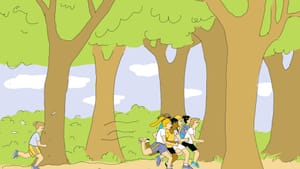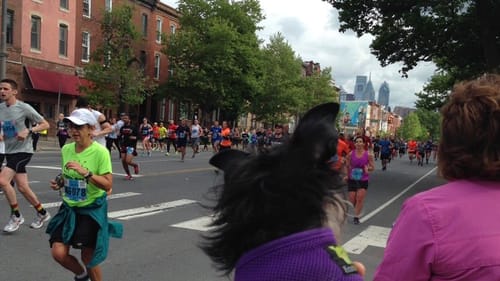Stay in the Loop
BSR publishes on a weekly schedule, with an email newsletter every Wednesday and Thursday morning. There’s no paywall, and subscribing is always free.
A modest proposal for the runners
Why I will never join the Broad Street Run

If I’ve heard it once, I’ve heard it a hundred times, especially in the weeks before the Broad Street Run. This time, it was my esteemed BSR editorial colleague Kyle V. Hiller, who’s about to run the race for the fourth year in a row: “It’s just not that hard.”
He’s referring to running 10 miles down Broad Street, starting just south of Olney and ending at the Navy Yard.
The participant
Running isn’t difficult. That’s the message I’ve gotten ever since the humiliating torture of the Presidential Physical Fitness tests came to my school in the 1990s. You could get one of three awards: the Presidential Award for the strongest, fastest, sportiest kids; the National Award, for the respectable, average athletes; and the Participant Award, for everyone else.
Guess which one I always got?
Some parts of the test (mercifully discontinued in 2012, a decade after I graduated from high school) weren’t too bad. I could sit and reach past my heels. I could do a bunch of sit-ups. Hell, I could even hold a flexed-arm hang for a couple of seconds. But the mile run dominated my school year not only as a mark of deep public shame but as a singular experience of enforced physical pain.
The island
My school had a gravelly parking lot around a small curbed island, dotted with determined little plantings. Someone measured the distance of one lap around the island, and we ran around it until the distance totaled one mile—the exact number of laps has been burned from my brain circuits, after all the times I staggered through the final lap. Sure, I wanted to do things like become a writer one day, but at the time, one goal eclipsed all others with a promise of absolute glory: I wanted to be able to run a whole mile.
And I was a kid who tried. I packed my red uniform on the morning of our weekly double period of PE class, stomach churning with dread. I got my parents to help me measure our driveway at home and passed lonely weekday afternoons trying to make that mile. Once the right toe of my sneaker caught in the too-long laces of my other shoe and I went down so hard that I sat in the bathtub to bandage myself, lest I bleed on the floor.
On the days of the Presidential Physical Fitness test mile run, I perched on the starting line, so anxious I couldn’t feel my fingertips. The first couple laps were okay, but by about the fourth time around, my windpipe began to ache and my lungs caught flame. My flesh grew splotchy-red and the salty, stinging skin of my face felt like bread dough rising in the oven. My legs seared and then trembled, and a pickaxe of pain hit my heels with every step.
I had to break into a walk, lungs heaving, vision wavering, while another kid holding a stopwatch (we partnered up and timed each other) exhorted me to start running again. As soon as I could bear it, I plodded back into a jog, willing myself to suck in air around the fire iron lodged in my bronchioles.

My best time
As I recall, the best time I ever made on the mile was about 12 minutes, while other kids flew around the track like Hermes. When I finally crossed the finish line, my torso felt like the inside of a barbecue. My vision darkened and I retched quiet, empty heaves over the schoolyard mulch. Eventually my wheezing quieted into a periodic cough that would last until bedtime. My cheeks would glow red for hours.
In other words, running is hard for me.
All the way through my sophomore year of college, I could never avoid at least one semester of running—I tried that mile for close to ten years. Since this was a school standard, I believed I would eventually become swift and comfortable if I just kept at it. Instead of wanting to lie down on the grass and die, I would feel euphoric waves of energy and peace.
It never happened.
So that’s what I remember when Philly’s legion Broad Street Runners say it’s pretty easy.
A good day
I couldn’t run 10 miles any more than I could jump off Race Street Pier and land in Camden. It was cold comfort to learn, as an adult, that several undiagnosed medical conditions had been thwarting my athletic career from the start, and if all my doctors ever agreed on one thing, it’s that I should avoid high-impact exercise. A good day for me is being able to walk to the Acme and back.
Whenever anyone suggests to me that running would get easier or even be enjoyable if I just gave it a good enough try, I wonder if there’s anything I could suggest to them. Essay writing is easy, I could say. You just access your most vulnerable memories and arrange them into cogent public narratives relevant to current events, with a clear overarching point and concise, compelling language—do it every week. I’m sure if you just practiced a bit you’d break through and feel the high. If I can do it, so can you.
Half my Philly friends will be pounding down Broad Street on Sunday. I want to make a deal with the runners. Acknowledge that, to many people, what you’re doing is extraordinary—your body lets you do something that many others can’t—and I will cheer you from the sidelines.
To read BSR associate editor Kyle V. Hiller’s take on the Broad Street Run, click here.
Sign up for our newsletter
All of the week's new articles, all in one place. Sign up for the free weekly BSR newsletters, and don't miss a conversation.

 Alaina Johns
Alaina Johns
 Illustration by Hannah Kaplan
Illustration by Hannah Kaplan